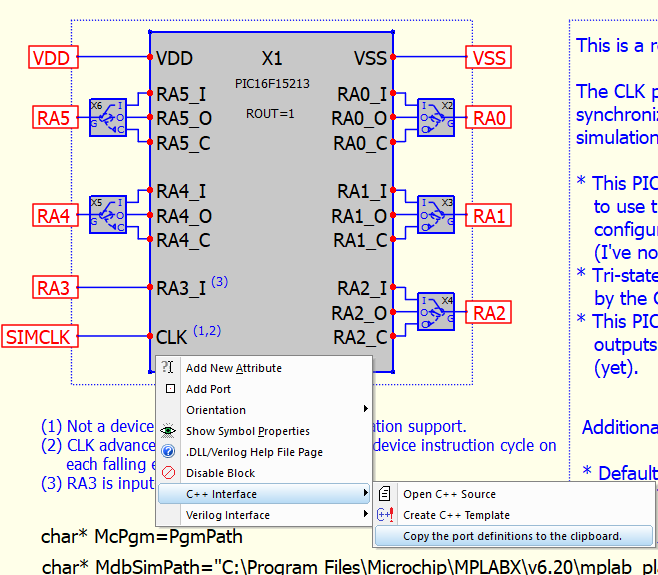Today’s QSpice update included the following revision note:
07/14/2025 Added a command to paste the variable declarations of the C++ interface to the clipboard so it's easier for you to edit the .cpp file after modifying the ports.
In the past, if you made any changes to a DLL block, you needed to generate a new C-Block code template to get the correct uData* definitions. That would overwrite your DLL *.cpp file with the generic template. Any prior code changes were lost.
The old work-around was to temporarily rename the DLL block in the schematic, generate template code to this temporary *.cpp, copy the uData array code from the temporary *.cpp to your existing code, and restore the block name in the schematic. Tedious and annoying, it was.
Now, right-clicking the C-Block in the schematic has a new option to generate only the uData port code directly into the clipboard. Open the C-Block *.cpp and paste the clipboard contents into the existing code and you’re done. (Of course, if you renamed/added/deleted ports or changed port data types, you still need to modify your code for the changes but you haven’t lost all of your existing code.)
For the above micro-controller C-Block, the clipboard contains:
double VDD = data[ 0].d ; // input
double RA0_I = data[ 1].d ; // input
double RA1_I = data[ 2].d ; // input
double RA2_I = data[ 3].d ; // input
double RA3_I = data[ 4].d ; // input
double RA4_I = data[ 5].d ; // input
double RA5_I = data[ 6].d ; // input
bool CLK = data[ 7].b ; // input
const char * MdbSimPath = data[ 8].str; // input parameter
const char * McPgm = data[ 9].str; // input parameter
double &RA0_O = data[10].d ; // output
bool &RA0_C = data[11].b ; // output
double &RA1_O = data[12].d ; // output
double &RA2_O = data[13].d ; // output
double &RA4_O = data[14].d ; // output
double &RA5_O = data[15].d ; // output
bool &RA1_C = data[16].b ; // output
bool &RA2_C = data[17].b ; // output
bool &RA4_C = data[18].b ; // output
bool &RA5_C = data[19].b ; // output
Many thanks to Mike for a most welcome new feature!
–robert
